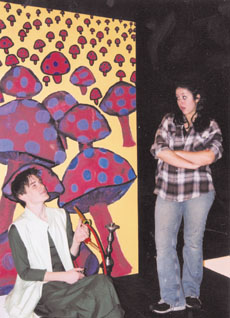Adventures in Wonderland

December 4, 2002
Welcome to Wonderland circa 1993, home to Goths, ravers, nerds, and anthropomorphic animals. Think you’re on a head-trip? Think again. For those in their early to mid-twenties, that was the beginning of high school and the tail end of junior high. Wonderland, directed by Eileen Rooney, is not only an exploration of etheric world but an odd metaphor for the pitfalls of adolescence.
From an insane tea party to the trip across the chessboard to Alice’s ascension to the throne beside her fellow Queens, this is the madness that is both Alice in Wonderland and Through the Looking Glass, successfully combining them without losing any of the content or parts pertinent to inner logic. Although both are separate works written by Lewis Carroll, one neatly segues into the other in this modern day version.
The first part covers Alice in Wonderland, and we meet Alice (Rachel Eliot), the basic outsider to the scene, wandering around and not quite fitting with any group, sitting on the checkered platform. Bored with learning her lessons like any other teen, she is distracted by a talking White Rabbit (Rocky Graziano) who consistently frets about being late for the queen’s party. “She’ll have my head!” he mutters at each interval.
From there, Alice falls down a hole, supported on the arms of two black-clad actors miming a bottomless pit, where she finally reaches the end and happens upon a bottle labeled “Drink Me.” Whether it’s helping the White Rabbit search for his gloves or playing croquet with the scarily sexy goth/dom Queen of Hearts, Alice is trying to find her way home, perhaps symbolic of the awkward adjustments of adolescence. Confounded and frustrated at every turn, she nearly breaks down in tears several times.
Through the Looking Glass is touched upon in the second half. Instead of confusing answers and meandering mind puzzles, Alice knows that she must get across the eight squares of the chessboard and become a queen in order not to lose her head and find a way back to her home. Here she meets Humpty Dumpty (Jenna Raymond), acts as a handmaiden to the perpetually disheveled Red Queen (Elissa Jordan), and tries to outrun the homicidal Queen of Hearts.
Done from a minimalist perspective, the main set consists of a stationary angled checkerboard with a series of revolving pieces, eliminating much of the confusion that comes with elaborate sets. This is the backdrop for the entire play.
Wonderland is a tale within itself that one must pay close attention to. Although much of the play revolves around seemingly bizarre wordplay, the narrative does follow a certain rhyme and reason that can be understood if it is thought through. “Jam tomorrow, jam yesterday, but never jam today,” is just one example. The Red Queen screaming because she knew she was going to prick her finger on the safety pin of her shawl, follows the perfectly and appropriately reversed cause and effect of being inside of a mirror. Punishment first, before the trial, proclaims Queen of Hearts, in another mind-bending bit of logical nonsense.
The chemistry between the actors coincides with the success of the performance of Wonderland. The delightful Mad Tea Party involves Danielle Brennan as the narcoleptic Doormouse abused by the Mad Hatter, Jenna Raymond, and the amusing Marta Johnson, a.k.a. the March Hare. The Queen of Hearts’ (Heather Phillips) retinue of children of the night includes Gregory Prescott doubling as the servile King of Hearts and dope-smoking Caterpillar, and the quiet but guilty-looking Kelly Escoto as the Knave of Hearts sneaking tarts. Tweedle Dee, (Kurt Lucas who also played the Mock Turtle and the Frog Footman), and Tweedle Dum (David Schipp) are the dynamically dorky duo. The quirky, humorous personalities of all the characters are fully exploited.
This is an all ages play that can be appreciated on any level. Children love it for its colorful characters and whimsical wordplay, while adolescents and adults can empathize with the paradoxes that it presents. It is easy to sympathize with Alice’s difficulties and Alice herself as her frustration at the foibles of the fools around her. Wonderland is representative of all the little twists and turns that life often takes.
This play was student-directed and run. More student work will be featured in the upcoming New Works Festival, starting December 5 and ending December 7. Performances begin at 8pm in McCormack Theatre. Tickets are $12.





















































